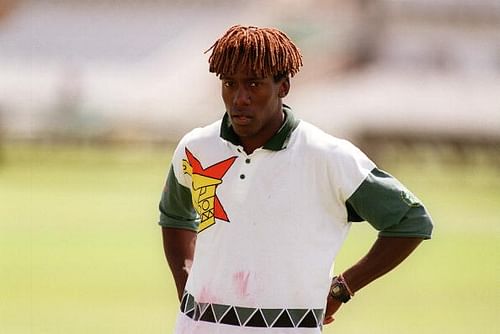
Cricket: The tale of two African nations

Henry Olonga
About 20 years ago, the landlocked African nation of Zimbabwe became the ninth Test-playing member of the ICC – a whole 115 years after Australia and England contested the first official Test match.
Around the same time, their neighbours South Africa made their international comeback. While the Zimbabweans were thrown into the deep waters of international cricket, the Proteas had cricketing ancestry straddling 120 years to fall back on. Even though they didn’t play at the apex echelon for more than two decades due to the apartheid regime, they always had a cricket crazy public and abundance of talent.
Since their re-admission in the early 1990s, South Africans have competed at the top level and have become one of the pre-eminent sides of the world. They have made enormous strides on the subject of race, which has always been in media spotlight, and have fielded players from a number of ethnically diverse cultures.
Cricket – once considered as the game of the privileged white men – is now played in every part of South Africa. Most of the credit for this change must go to the South Africa’s development programme, which started long before the country held its first democratic elections in 1994.
South African cricket went through many emotional and psychological eras within a single generation since apartheid lost its vicious grip.
Today they sit proudly on top of the world Test rankings and the likes of Hashim Amla, Robin Peterson and Vernon Philander are in the side not because of any reservation policy, or because the ruling African National Congress has used political muscle. They are there because they deserve to be there.
However, their Zimbabwean counterparts have succumbed to political turmoil that has rocked the country frequently. Zimbabwe struggled at the international stage during their initial years, but by the end of 2000 they had established themselves as a decent lineup.
Zimbabwe continued to produce timely upsets. With the talent on board, there was constant optimism that they would be able to reach the league where the top teams existed. In these times, the country nurtured some fine talents like Alistair Campbell, Heath Streak, Andy Flower and Grant Flower (mostly whites), to name a few.
But before all of that, came their first Test victory in 1995 when they defeated Pakistan by an innings and 64 runs in Harare. Not only was this match significant because of its result, but it also included the first black Zimbabwean to be capped. That Zimbabwean was Henry Olonga. He was the pride of the Zimbabwean people of colour.
It all started to fall apart in the 2000-01 season though, when players started to allege political interference in the running of the game. The Zimbabwean President Robert Mugabe began to infiltrate into the selection policies of the team. Mugabe charted out a quota system for selection of a minimum number of black players in the team. This policy was clearly against the spirit of the game.
The Zimbabwe players started to revolt against this move, terming it as non-democratic. It all escalated when Andy Flower and Henry Olonga decided to wear black armbands for the entire duration of the 2003 World cup. The cricket community showed the players their support as England forfeited their match in Zimbabwe.
But Mugabe used his power to arm-twist the board. Henry Olonga retired and left the country fearing for his life. The following year, Streak was removed from the captaincy and several other players quit in protest. In 2006, Zimbabwe voluntarily removed itself from Test matches. The team did not play Tests again until 2011 when they made a winning comeback against Bangladesh.
In the present scenario, things have finally started to look up for Zimbabwe under Brendon Taylor. The team is slowly working its way back into the international cricket calendar. As the political and economic situation of the country continues to be tense, everyone will hope it will become a more stable nation and a settled cricket team.